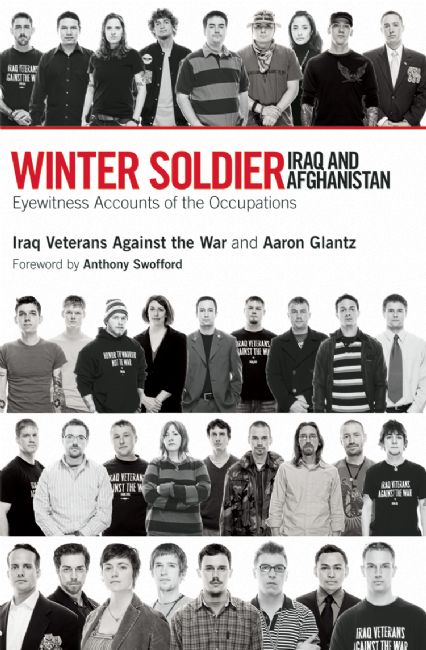Winter Soldier: Iraq and Afghanistan

A Call to Conscience
Winter Soldier: Iraq and Afghanistan
Eyewitness Accounts of the Occupations
by Iraq Veterans Against the War and Aaron Glantz
Haymarket Books, 2008, 240 pages, $16.00
 Heart-rending, shocking and awful, tear-jerking, infuriating, and guilt-inducing, Winter Soldier: Iraq and Afghanistan is difficult, even painful, to read. This compilation of some of the testimonies given at the National Labor College in Silver Spring, Maryland, March 13–16, 2008, and a subsequent congressional hearing, should wake up the complacent or numbed citizens of the United States who have let these wars and occupations drag on so long.
Heart-rending, shocking and awful, tear-jerking, infuriating, and guilt-inducing, Winter Soldier: Iraq and Afghanistan is difficult, even painful, to read. This compilation of some of the testimonies given at the National Labor College in Silver Spring, Maryland, March 13–16, 2008, and a subsequent congressional hearing, should wake up the complacent or numbed citizens of the United States who have let these wars and occupations drag on so long.
The Iraq and Afghanistan vets tremendously honor their Vietnam War predecessors in using the name and the style of the earlier era’s soldier speakout to again tell it like it is. As was the event itself, the book is organized into categories, to make some sense of the insanity that is war, or at least examine it systematically.
In “The Costs of War at Home,” military family members speak about suicide after being denied mental health care and being lied to by the military about how a loved one died. Iraqis speak about survival guilt seeing another take “their” bullet, as well as home and school invasions. “They wrapped our hands so tight my hands turned blue,” said Mohammad Amr from the Adhamiya district of Baghdad. “And they dislocated my shoulder. They beat my father too and he’s 60 years old. They also took our cell phones, our blankets, even our clothes. We didn’t see any humanity in the American soldiers, only cruelty.”
The soldiers’ stories are full of blood and gore but also tremendous frustration at the impossibility of upholding “Rules of Engagement” or refraining from “Racism and the Dehumanization of the Enemy,” titles of two categories. These courageous young people debunk the myths—perpetuated among soldiers and civilians alike—about enforcing rules and staying honorable in the midst of a total cancellation of rules and honor, which is what war is. Army National Guard Medic Andrew Duffy relates an incident where a sergeant abused an Abu Ghraib detainee. “The sergeant picked up the blind-folded man by the flexi-cuffs, threw him off the back of the Humvee, face-down, chest-down, in the gravel, and said, ‘You can’t spell abuse without Abu.’”
The veterans acknowledge their own responsibility for the carnage and reject the complicity of silence. Marine Corps Rifleman Sergio Kochergin states, “The Rules of Engagement were very flexible. After our own casualties mounted the Rules changed. … A lot of the enemy combatants that we shot were really civilians in the wrong place at the wrong time. … I want to apologize to all the people of Iraq. I’m sorry, and I hope this is going to be over as soon as possible.”
An important category is “Divide and Conquer: Gender and Sexuality in the Military.” Sadly, one of the testimonies in this section is anonymous, a Coast Guard member from Vermont who was raped by a fellow service member. She was heavily pressured not to press charges and prevented from accomplishing tasks needed for promotion. Later she was even threatened with prison. She relates, “I was naive in thinking that someone would actually do their job, put a criminal behind bars, but the system failed me. Eventually the threats from my lawyer were so severe and traumatizing that I had no other choice but to drop the charges.”
Jeff Key, Marine Reserve vehicle tech, says, “At the core of this war machine is an ideology that is based on the gender paradigm and homophobia. I can tell you from personal experience that young straight men, otherwise good men, will go to great lengths and do horrible things to prove that they’re not gay.”
Chair of the IVAW Board Camilo Mejia, the first Iraq war soldier to go public refusing to return, concludes by reminding us all, “Ending the occupations is not a battle that antiwar GI’s should have to wage by ourselves.” Anthony Swofford, in his foreword, gave us our orders: “Do not turn away from these stories. They are yours, too.”
